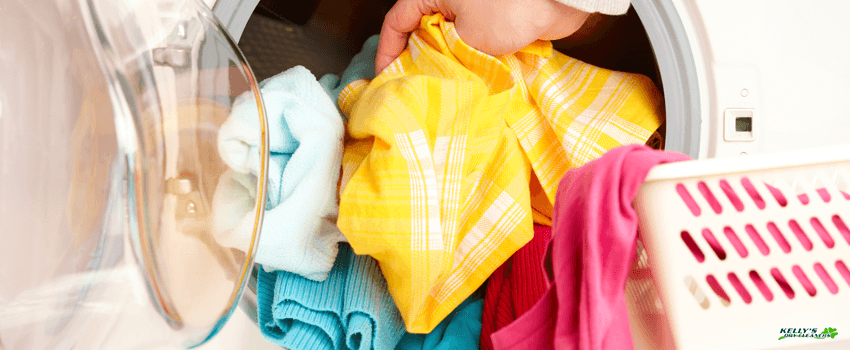Surprisingly, even though your sheets and clothing are clean, bacteria can still be found in them.
According to published research, domestic washing machines clean soiled clothing and textiles but do not sterilize them. Five Belgian households participated in the study to determine if there was a transfer of bacteria on clothes and adding new cotton t-shirts. For a minimum of one month, all households where laundry was observed were healthy and bacteria-free.
Researchers found skin-related bacteria, clothing-related bacteria, permeate water bacteria, and microbe-related bacteria in the washing machines after doing loads of laundry. Although some bacteria were found in the discharged water, they found a cotton sample to be bacteria-free. The laundered cotton t-shirt contained nearly all the bacteria found on the cotton sample. After washing, the cotton t-shirts developed a wide range of everyday clothing and skin-related bacteria. As a result, bacteria that cause odors in the wash have the potential to spread to other items. The bacteria found in the items after they had been washed and were supposed to be clean was likely caused partly by germs found on the dirty laundry.
How Clothes and Towels Spread Germs and Bacteria
There are three common ways that germs can spread on towels and clothing:
-
When more than one person shares towels and bedlinens, germs can be spread between them
-
When someone is handling dirty laundry, they can spread germs to their hands.
-
Germs can be spread from clothes to clothes when they are washed.
Ways Bacteria and Germs Can Contaminate Clothes
Our bodies are the source of the germs found on towels and clothing. We all have bacteria on our skin, in our noses, and our digestive tracts. Although they are typically harmless, certain bacteria can cause infection, particularly in individuals with skin conditions or open wounds.
Germs cannot penetrate normal skin, but they can colonize normal skin. Most infections, regular hand washing is more crucial than regular laundry.
If you are caring for someone with a disease or cleaning up their vomit, you may also be exposed to germs on your clothing. When clothing is exposed to food that has been contaminated, they can also transfer to the clothing. Most bacteria on clothes can survive for a long time.
Reasons Why Clothes Still Smell After Washing
If this is the case, it could be for several reasons. You essentially stuff it with bacteria when you load your washing machine with dirty clothes, linens, and other items. You would naturally anticipate that all your clothing and linens will emerge clean and sanitized. Think again.
When washing their clothes, many people use more anti-bacterial laundry detergent or hotter water. This may help for a short time, but it doesn’t address the underlying issue. Fabrics endure significant wear and tear as a result of excessive washing. It may also result in the loss of detergent, water, and energy.
The fastest way to resolve an issue is to identify its underlying cause. You should sanitize your washing machine regularly.
Potential Causes of Lingering Odors in Clothes After Washing
Your clothes were left in the washing machine for too long.
When you discover a mildew odor on your clothes after leaving them in the washer overnight, it’s probably not a big surprise. Bacteria, mold, and mildew thrive in a moist, dark environment like a washing machine. Over time, they can accumulate in your clothing, giving them a permanent odor. Sometimes, you need a kitchen timer to remind yourself to transfer your clothes to the dryer. Since many experts have been asked does the dryer kill bacteria? they’ve conducted tests to prove it.
Your washer has a buildup of bacteria.
Dirt and excess detergent can build up over time, so you need to sanitize your washing machine to clean and disinfect regularly. A build up may be visible, but it could also be hidden within the walls of the drum.
Using too much detergent.
As the saying goes, less really is more. When removing odor-causing bacteria from your clothing, it makes sense to use enough detergent and laundry disinfectant but overdoing it could have the same effect. A buildup of suds can trap bacteria in the fabric if too much soap is used. The odor in your clothes may be held in by leftover detergent if you’ve ever taken them out and noticed that they felt heavier than usual.
This is especially true for sweat-absorbing synthetic fabrics and workout attire. Due to the wicking properties of these garments, the natural shedding of skin cells and sweat becomes trapped in the fabric’s ridges. Wash the clothes with about a cup of vinegar to dissolve the detergent safely. Then use a clothes sanitizer.
Keep Clean Laundry Clean
Here are the best ways to guarantee clean and bacteria-free laundry:
1. Clean hands and common sense are crucial to success.
You won’t become ill as long as you wash your hands and don’t have any open wounds. The key is to wash your hands correctly.
According to health professionals, this entails washing the hands with water, cleaning all their surfaces, especially between the fingers and under the nails, rinsing, and then repeating the process.
2. Separate Towels.
You may not want to throw away your used towels with your dirty laundry: Towels are typically more contaminated than clothing. Since towels are so thick, they retain moisture longer. This may allow pathogens to survive.
Clean Clothes The Best Way
To eliminate germs from your laundry, wash your clothes with the best anti-bacterial laundry detergent and laundry disinfectant, on a hot cycle and then dry them for 45 minutes.
Use bleach to clean whites or color-safe bleach for colored clothes.
Do your laundry in at least 140 degrees Fahrenheit water to eliminate any viruses or bacteria. Lastly, use a clothes sanitizer.
Give Your Clothes the Care they Need With Kelly’s Dry Cleaners.
To guarantee fresh, clean, and sanitized laundering service each time, you should seek the assistance of laundry experts from our dry cleaners in Farmington. We use only the best anti-bacterial laundry detergent, laundry disinfectant, and clothes sanitizer to guarantee that there are no bacteria on clothes and to ensure ultimate customers’ satisfaction. Contact us today to know more about our services.



